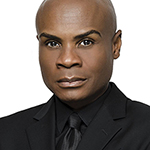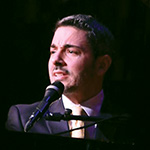Cabaret
Studio 54, NYC, April 29, 2014
Reviewed by Elizabeth Ahlfors for Cabaret Scenes
 Kander and Ebb’s Cabaret remains a landmark musical with extraordinary songs, diverse rhythms and sharp lyrics fitting neatly in Joe Masteroff’s stirring book. The last production finished its run at Studio 54, which again houses the famed Kit Kat Club in the current Cabaret, complete with its inimitable allure of threat and cynicism.
Kander and Ebb’s Cabaret remains a landmark musical with extraordinary songs, diverse rhythms and sharp lyrics fitting neatly in Joe Masteroff’s stirring book. The last production finished its run at Studio 54, which again houses the famed Kit Kat Club in the current Cabaret, complete with its inimitable allure of threat and cynicism.
Robert Brill designed the theater as a nightclub with small tables and fringed, red lampshades. A feel of restless sexiness rustles in the room before the show as members of the Kit Kat cast chat with audience members in the front or wander mingling around the crowd. Dressed by William Ivy Long in stretchy black and white, others in the ensemble do elastic stretches, practice their brass instruments, and chat among themselves. And then a hush, darkness, a drum roll, a cymbal crash. The peep door opens and the Emcee’s eyes appear. He enters.
“Willkommen, Bienvenue, Welcome/ Im Cabaret, Au Cabaret, To Cabaret!” Alan Cumming remains delectably sleazy as the Emcee, perhaps more so than in the 1998 production—still a classic and forever relevant. Far from Eli Gold, the dapper political manipulator on The Good Wife, Cummings delves deeper into the multi-layered dissipated in pre-World War II Berlin. With exaggerated makeup and his over-the-top malevolence, the Emcee is starkly diabolical. Like others in the club, he is aware of the Nazi threat closing in on them, but while some turn blindly away, the Emcee celebrates more and more frantically until everything slams shut.
Sally Bowles is one of the Kit Kat singers. English-born Sally, played by film actress Michelle Williams in her Broadway and musical debut, is a singer and sometime dancer, not great, not bright, not brave. Unlike Liza Minnelli, a show-stopping dancer and singer, and Natasha Richardson, a strong actress who had a firm understanding of the irresponsible Sally, Williams is bland and somewhat restrained. A pretty woman with a young, round face, Sally’s necessary charisma is missing. Williams’s singing voice is on key, yet, “Mein Herr” and “Don’t Tell Mama” do not exude the needed down-and-dirty sexiness. However, she puts a new spin on the title song, singing it stock-still at the microphone, almost frozen, with a restrained anger which, at the end, cracks. She shows another vulnerability in “Maybe This Time” after Cliff, her love interest, promises he will stick with her and their expectant child.
Cliff Bradshaw, an American novelist played by Bill Heck, is visiting Berlin. His bisexuality is now made clearer after being hinted about in previous versions, but he gets close to Sally and, later, hurt by her.
The spark of the play is Cummings’s Emcee, but the heart of the play is the romance between Frau Schneider (Linda Emond) and Herr Schultz (Danny Burstein). The middle-aged duo bring out the sweetness of romance between a German landlady, never married, and a German fruit merchant, who is Jewish. Burstein (Follies, Golden Boy), who shines as an actor and singer, plays the touching suitor who joins Emond in “It Couldn’t Please Me More” and “Married.” As for Emond (Death of a Salesman), she surprised with her strong singing voice in the plaintive “What Would You Do?”
Other cast members include a Nazi, Ernst (Aaron Krohn), as a dark shadow who interrupts several moments of promise with veiled reminders of what is to come, as when Frau Schneider and Herr Schultz are celebrating their engagement. Another notable is tough party-girl, Fräulein Kost (Gayle Rankin).
Director Sam Mendes and co-director/choreographer Rob Marshall keep the diverse storylines moving with precision and timed for surprise. Cabaret was inspired by Christopher Isherwood’s stories, Goodbye to Berlin and John Van Druden’s play, I Am a Camera, and the character of Cliff is based on Isherwood.
First came the original 1966 Broadway original production that ran over 1,000 performances.
A few years later there was a classic film version and in 1998, a memorable production with over 2,000 performances. As often as I have seen this show, I feel more depths of emotion.
It never fails to jolt when the Emcee, with one last “Auf Wiedersehen!”, removes his coat to show he is wearing the clothes of a concentration camp prisoner. Still a classic and forever relevant.
(Photo: Michelle Williams, Alan Cumming and Kit Kat Girls by Joan Marcus)





